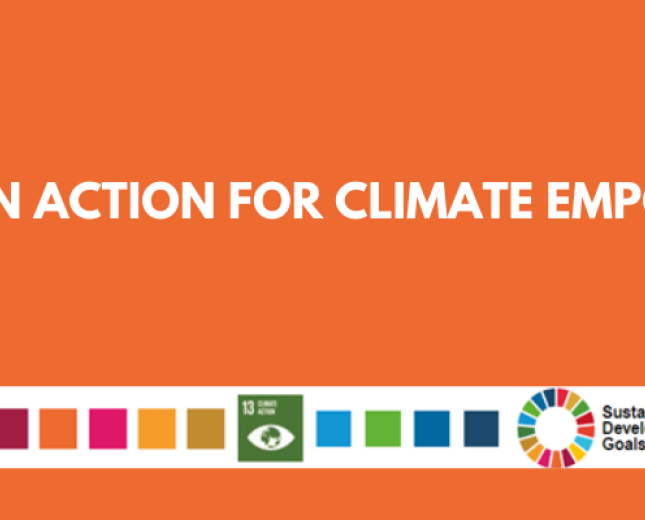8th Dialogue on ACE - Africa and Middle East
Recording in English click here
Recording in French click here
Background: Action for Climate Empowerment (ACE) denotes work under Article 6 of the Convention and Article 12 of the Paris Agreement (2015) and their six elements: Climate Change Education, Training, Public Awareness, Public Access to Information, Public Participation, and International Cooperation on these issues. Implementation of all six elements has increasingly been recognized as crucial in solving the complex challenges presented by climate change. This is also reflected in the Sustainable Development Goals (for example SDG targets 4.7 and 13.3) to which the ACE agenda is closely related.
Mandate: At COP 18, Parties adopted the Doha work programme on Article 6 of the Convention and requested that the SBI organize an annual in-session Dialogue on Action for Climate Empowerment (ACE) in order to enhance work in the areas of climate change education, training, public awareness, public participation, public access to information, and international cooperation on these matters. At COP 25 in Madrid, Spain, Parties adopted the terms of reference for the review of the Doha work programme on Article 6 of the Convention. By this Decision, Parties requested the secretariat to organize the 8th Dialogue on ACE in 2020 to advance the discussions on recommendations and views on future work to enhance implementation of ACE.
Objective: The objective of the Dialogue is to provide a forum for Parties and other non-Party stakeholders to advance the discussions on recommendations and views on future work to enhance implementation of Action for Climate Empowerment. Virtual regional dialogues aim at providing background to and sharing knowledge among Parties and non-Party stakeholders of each region, bringing all onto the same page regarding the current status of ACE implementation.
Methodology: Due to the COVID-19 outbreak, the 8th Dialogue on ACE will be organized through four virtual regional dialogues and two global events. Each session of the regional dialogues will focus on the following topics:
- Fostering in-country cross-sectoral collaboration on ACE;
- Promoting regional knowledge sharing and highlighting good practices to follow-up on and review the implementation of the Doha work programme on ACE; and
- Providing recommendations and views on future work to enhance ACE implementation towards 2030.
Participation: The 8th Dialogue will be open for participation by Parties, representatives of relevant bodies established under the Convention, relevant experts, practitioners, and stakeholders. The Doha work programme specifies that key stakeholders include intergovernmental and non-governmental organizations, in particular women, indigenous peoples, youth-focused organizations, the private sector, and the media.
With a view to foster virtual participation, the following groups of experts whose work closely relates to the discussed topics will be targeted: ACE focal points, ACE negotiators, UNFCCC focal points, staff responsible for updating the NDCs at the national level, Ministries of education, and other stakeholders engaged in ACE issues.
Registration: Online registration was required for the regional dialogues.
Logistical arrangements: Regional dialogues had a duration of three hours.
Provisional Agenda
| Welcome and Introduction |
| 13:00 - 13:15 |
Technical admin for the dialogue and introduction of the co-facilitators
- Ms. Fleur Newman, Unit Lead, Action Empowerment Unit, UN Climate Change
Outline objectives of the Dialogue by the facilitators
- Mr. Kamal Djemouai, Advisor to the Chair of the African Group of Climate Negotiators (AGN)
- Ms. Penda Kante Thiam, ACE Lead Coordinator for the Least Developed Countries (LDCs) and the African Group of Climate Negotiators (AGN), Senegal
Welcoming remarks
|
| ACE in the UNFCCC Process |
| 13:15 - 13:25 |
Background on ACE and the Synthesis Report
|
| Fostering Cross-sectoral Collaboration on Action for Climate Empowerment |
| 13:25 - 13:40 |
How to Integrate ACE into Nationally Determined Contributions
- Ms. Carolyn Medel-Anonuevo, Head of the Education Unit, UNESCO Regional Office for Southern Africa EN FR
Questions and answers (for UN Climate Change and UNESCO)
|
| Review of the Implementation of the Doha Work Programme on ACE |
| 13:40 - 14:40 |
Good Practice of ACE Policy
- Mr. Comlan Medárd Ouinakonhan, National Focal Point for ACE, Ministry of Environment and Sustainable Development, Benin
Good Practice of Education
- Ms. Shanu Misser, National Coordinator, Fundisa for Change programme, South Africa
Good Practice of Training
Good Practice of Public Access to Information
- H.R.H Princess Abze Djigma, Special Envoy of the President of Burkina Faso
Good Practice of Public Participation
- Dr. Emmanuel Tachie-Obeng, National Focal Point for ACE, Environmental Protection Agency, Ghana
Good Practice of Public Awareness
Questions and answers
Moderated discussion
- What worked well that could continue post 2020?
- What are the remaining gaps and needs?
|
| 14:40 - 14:55 |
Break |
| Recommendations and Views on Future Work to Enhance ACE Implementation |
| 14:55 - 16:00 |
Information Note: Options and ways for future work to enhance the implementation of ACE
Ensuring Policy Coherence for ACE
- Mr. Bob Natifu, National Focal Point for ACE, Ministry of Water and Environment, Uganda
Tools and Support for ACE
Monitoring & Reporting of ACE
- Ms. Lydia Elewa, National Focal Point for ACE, Environmental Affairs Agency, Egypt
Role of Non-Party Stakeholders on ACE
International Cooperation on ACE
- Dr. Ambe Emmanuel Cheo, Associate Academic Officer, United Nations University Institute for Environment and Human Security
Questions and answers
Moderated discussion
- What do we want to achieve towards 2030?
- What is needed to achieve it?
Closing remarks
- Next steps, Ms. Fleur Newman, Unit Lead, Action Empowerment Unit,
UN Climate Change
- Closing remarks, Mr. Sergio Costa, Italian Minister for the Environment, Land and Sea on behalf of the UK-Italy Partnership to COP 26
|
